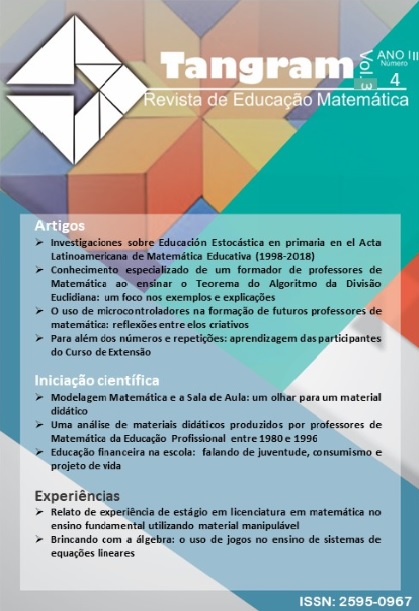The use of microcontrollers in the formation of future mathematics teachers: reflecting between creative links
DOI:
https://doi.org/10.30612/tangram.v3i4.12806Keywords:
Creative Chain. Microcontrollers. Initial teacher training.Abstract
This report aims to discuss the extent to which and how the use of microcontrollers in teaching practices based on creative links can contribute to the formation of future mathematics teachers. To this end, the study was carried out in the Teaching Practice II discipline, in the Mathematics Degree Course, at the Federal University of Mato Grosso do Sul (UFMS) - Campus Campo Grande. The Creative Chain was elaborated as a theoretical and methodological contribution, which is anchored in the socio-historical-cultural development approach, linked to the historical, conceptual and practical aspects inherent to the Arduino prototyping platform. Throughout the research, the diary with the participants' reflections was adopted as a data collection instrument. The work resulted in different contributions, both in terms of expanding the repertoire related to the practice of programming, and in the relevance of sharing desires and meanings in the context of the initial formation of mathematics teachers.Downloads
References
Buechley, L. et. al. (2008). The lilypad Arduino: using computational textiles to investigae engagement, aesthetics, and diversity in computer Science education. In: ACM. Procedings of the SIGCHI conference on Human factors in computing systems, p. 423-432.
Csikszentmihalyi, M. (1988). Society, culture, and person: a system view of creativity. In: Stemberg, Robert J. (Org.). The nature of creativity. Nova York: Cambridge university Press, p. 325- 339.
Evans, M.; Noble, J.; Hochenbaum, J. (2013). Arduino em ação. São Paulo: Novatec.
Freire, P. Pedagogy of the oppressed. (1972). Nova Iorque: Herder and Herder.
Gontijo, C. H.; Carvalho, A. T.; Fonseca, M. G.; Farias, M. P. (2019). Criatividade em Matemática: Conceitos, metodologias e avaliação. Brasília: Editora Universidade de Brasília.
Leontiev, A. [1977] (2003). Activity, consciosness and personality. Englewood Cliffs, NJ: Prentice Hall.
Lévy, P. (1999). Cibercultura. São Paulo: Ed. 34.
Liberali, F. C. (2018). Cadeia Criativa: Conceitos Centrais. Liberali, F. C. & Fuga, V. P. (Orgs.). Cadeia Criativa: teoria e Prática em discussão, Campinas, SP: Pontes Editora.
Martins, M. R. O. (2016). Uso Da Plataforma Microcontrolada Arduino no Ensino De Eletrodinâmica. Dissertação (Mestrado) Universidade Federal Do Pampa, Mestrado Profissional Em Ensino De Ciências.
Mafra, M. F. (2019). Contribuições para o ensino de eletrônica e robótica nas escolas de ensino médio de Presidente Prudente e região. Dissertação (mestrado) - Universidade Estadual Paulista (Unesp), Faculdade de Ciências e Tecnologia, Presidente Prudente.
Mcroberts, M. (2011). Arduino Básico. São Paulo: Novatec.
Novacoski, M. P. (2017). O Arduino na Programação de experiencias em termodinâmica e em Física Moderna. Dissertação (Mestrado em Ensino de Física; Formação de Professores de Física; Física na Educação Básica) - UNIVERSIDADE ESTADUAL DE PONTA GROSSA, Ponta Grossa.
Pereira, J. A. (2018). Um recurso didático para o ensino de energia baseado na plataforma Arduino. Dissertação (Mestrado em Ensino de Ciência e Tecnologia) - Programa de Pós-Graduação em Ensino de Ciência e Tecnologia, Universidade Tecnológica Federal do Paraná, Ponta Grossa.
Reas, C.; Fry, B. (2007). Processing: a programming handbook for visual designers and artists. Mit Press.
Rodrigues, R. F. (2014). Arduino como uma ferramenta mediadora no ensino de física. DISSERTAÇÃO (Mestrado Profissional em Ensino De Ciências, Instituto De Física, Programa De Pós-Graduação em Ensino de Física) Universidade Federal Do Rio Grande Do Sul, Porto Alegre.
Santos, J. A. (2016). Instrumentação eletrônica com arduino aplicada ao ensino de Física. Dissertação (Mestrado Nacional Profissional Em Ensino De Física) – Universidade Federal Rural de Pernambuco. Unidade Acadêmica de Garanhus, Garanhus.
Silva, A. J. B. da. (2014). Um modelo de baixo custo para aulas de robótica educativa usando a interface arduino Dissertação (Mestrado em Modelagem Computacional de Conhecimento) - Instituto de Computação, Programa de Pós-Graduação em Modelagem Computacional de Conhecimento, Universidade Federal de Alagoas, Maceió.
Spinoza, B. [1677]. (2003). Ética demonstrada à maneira dos geômetras. Tradução: Jean Melville. São Paulo, Martin Claret.
Vygotsky, L. S.; Luria, A. R.; Leontiev, A. [1934]. (2006). Linguagem, desenvolvimento e aprendizagem. 10. Ed. Trad. Maria da penha Vilalobos. São Paulo: Ícone.
Downloads
Published
How to Cite
Issue
Section
License
Authors must accept the publication rules when submitting the journal, as well as agree to the following terms:
(a) The Editorial Board reserves the right to make changes to the Portuguese language in the originals to maintain the cultured standard of the language, while respecting the style of the authors.
(b) Authors retain the copyright and grant the journal the right to first publication, with the work simultaneously licensed under the Attribution-NonCommercial-ShareAlike 3.0 Brazil (CC BY-NC-SA 3.0 BR) that allows: Share - copy and redistribute the material in any medium or format and Adapt - remix, transform, and create from the material. CC BY-NC-SA 3.0 BR considers the following terms:
- Attribution - You must give the appropriate credit, provide a link to the license and indicate whether changes have been made. You must do so under any reasonable circumstances, but in no way that would suggest that the licensor supports you or your use.
- NonCommercial - You may not use the material for commercial purposes.
- Sharing - If you remix, transform, or create from material, you must distribute your contributions under the same license as the original.
- No additional restrictions - You may not apply legal terms or technological measures that legally restrict others from doing anything that the license permits.
(c) After publication, authors are allowed and encouraged to publish and distribute their work online - in institutional repositories, personal page, social network or other scientific dissemination sites, as long as the publication is not for commercial purposes.






